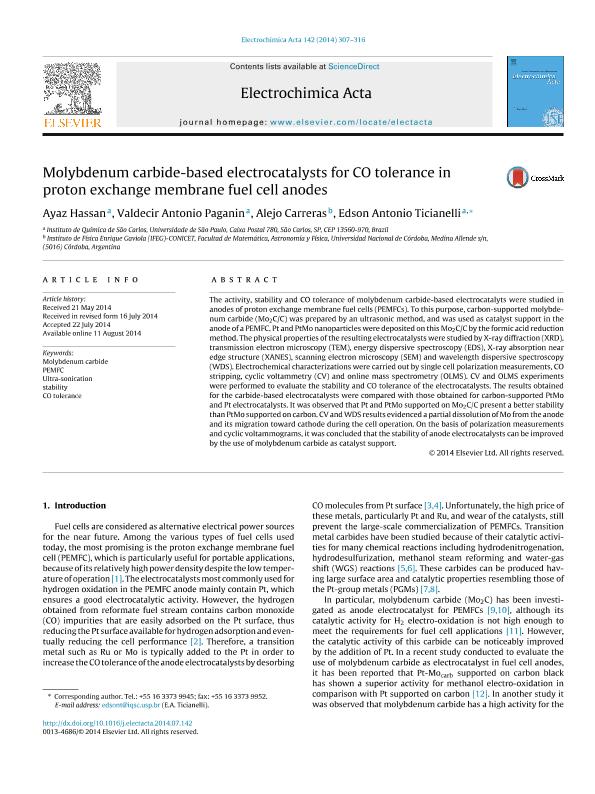Mostrar el registro sencillo del ítem
dc.contributor.author
Hassan, Ayaz
dc.contributor.author
Paganin, Valdecir Antonio
dc.contributor.author
Carreras, Alejo Cristian

dc.contributor.author
Ticianelli, Edson Antonio
dc.date.available
2023-01-26T12:59:38Z
dc.date.issued
2014-10
dc.identifier.citation
Hassan, Ayaz; Paganin, Valdecir Antonio; Carreras, Alejo Cristian; Ticianelli, Edson Antonio; Molybdenum carbide-based electrocatalysts for CO tolerance in proton exchange membrane fuel cell anodes; Pergamon-Elsevier Science Ltd; Electrochimica Acta; 142; 10-2014; 307-316
dc.identifier.issn
0013-4686
dc.identifier.uri
http://hdl.handle.net/11336/185728
dc.description.abstract
The activity, stability and CO tolerance of molybdenum carbide-based electrocatalyts were studied in anodes of proton exchange membrane fuel cells (PEMFCs). To this purpose, carbon-supported molybdenum carbide (Mo 2C/C) was prepared by an ultrasonic method, and was used as catalyst support in the anode of a PEMFC. Pt and PtMo nanoparticles were deposited on this Mo2C/C by the formic acid reduction method. The physical properties of the resulting electrocatalysts were studied by X-ray diffraction (XRD), transmission electron microscopy (TEM), energy dispersive spectroscopy (EDS), X-ray absorption near edge structure (XANES), scanning electron microscopy (SEM) and wavelength dispersive spectroscopy (WDS). Electrochemical characterizations were carried out by single cell polarization measurements, CO stripping, cyclic voltammetry (CV) and online mass spectrometry (OLMS). CV and OLMS experiments were performed to evaluate the stability and CO tolerance of the electrocatalysts. The results obtained for the carbide-based electrocatalysts were compared with those obtained for carbon-supported PtMo and Pt electrocatalysts. It was observed that Pt and PtMo supported on Mo 2C/C present a better stability than PtMo supported on carbon. CV and WDS results evidenced a partial dissolution of Mo from the anode and its migration toward cathode during the cell operation. On the basis of polarization measurements and cyclic voltammograms, it was concluded that the stability of anode electrocatalysts can be improved by the use of molybdenum carbide as catalyst support.
dc.format
application/pdf
dc.language.iso
eng
dc.publisher
Pergamon-Elsevier Science Ltd

dc.rights
info:eu-repo/semantics/openAccess
dc.rights.uri
https://creativecommons.org/licenses/by-nc-sa/2.5/ar/
dc.subject
CO TOLERANCE
dc.subject
MOLYBDENUM CARBIDE
dc.subject
PEMFC
dc.subject
STABILITY
dc.subject
ULTRA-SONICATION
dc.subject.classification
Otras Ciencias Físicas

dc.subject.classification
Ciencias Físicas

dc.subject.classification
CIENCIAS NATURALES Y EXACTAS

dc.subject.classification
Otras Ciencias Químicas

dc.subject.classification
Ciencias Químicas

dc.subject.classification
CIENCIAS NATURALES Y EXACTAS

dc.title
Molybdenum carbide-based electrocatalysts for CO tolerance in proton exchange membrane fuel cell anodes
dc.type
info:eu-repo/semantics/article
dc.type
info:ar-repo/semantics/artículo
dc.type
info:eu-repo/semantics/publishedVersion
dc.date.updated
2023-01-19T11:24:04Z
dc.journal.volume
142
dc.journal.pagination
307-316
dc.journal.pais
Estados Unidos

dc.description.fil
Fil: Hassan, Ayaz. Instituto de Química ; Universidade Do Sao Paulo;
dc.description.fil
Fil: Paganin, Valdecir Antonio. Instituto de Química ; Universidade Do Sao Paulo;
dc.description.fil
Fil: Carreras, Alejo Cristian. Consejo Nacional de Investigaciones Científicas y Técnicas. Centro Científico Tecnológico Conicet - Córdoba. Instituto de Física Enrique Gaviola. Universidad Nacional de Córdoba. Instituto de Física Enrique Gaviola; Argentina
dc.description.fil
Fil: Ticianelli, Edson Antonio. Instituto de Química ; Universidade Do Sao Paulo;
dc.journal.title
Electrochimica Acta

dc.relation.alternativeid
info:eu-repo/semantics/altIdentifier/url/https://www.sciencedirect.com/science/article/pii/S0013468614015667
dc.relation.alternativeid
info:eu-repo/semantics/altIdentifier/doi/http://dx.doi.org/10.1016/j.electacta.2014.07.142
Archivos asociados
